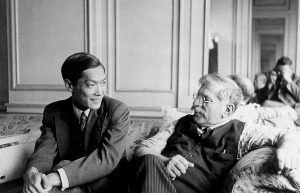Through science to justice: marking the 150th birthday of revolutionary sexologist Magnus Hirschfeld whose legacy resonates around the world…

Magnus Hirschfeld met Li Shiu Tong, the companion of his twilight years, in Hong Kong
Jonny Nord / Wikimedia / (CC BY 4.0) / https://creativecommons.org/licenses/by/4.0/deed.en
I confess that it was more difficult for me to leave Jerusalem than any other city I visited on my world trip, I was never so sorry to bid farewell to any country as to Palestine.” That’s not a quote from the notebooks of Albert Einstein but by sexologist Magnus Hirschfeld (1868-1935) one of the first great pioneers of the gay liberation movement. “Hirschfeld’s legacy resonates throughout the twentieth-century and around the world,” explains his biographer Ralf Dose. “Guided by his motto ‘Through Science Toward Justice,’ Hirschfeld helped found the Scientific Humanitarian Committee in Germany to defend the rights of homosexuals and develop a scientific framework for sexual equality. He was also an early champion of women’s rights, campaigning in the early 1900s for the decriminalization of abortion and the right of female teachers and civil servants to marry and have children.”
Born to a Jewish family in Kolberg on May 14, 1868, Magnus Hirschfeld studied medicine at various universities throughout Germany. He completed his doctorate in 1892 before traveling the United States and then setting up a medical practice in Magdeburg. In 1896, he moved to Berlin where he began research into sex and sexuality. He became the object of significant respect and attention, both at home and internationally, with an entry in Jüdisches Lexikon, a fine encyclopedia harvesting the best of German Jewish scholarship, in 1928. His political activism, his Jewishness and homosexuality made him a target for rightwing attacks from the 1920s onward. He was abroad when his Institute for Sexual Sciences was raided by Nazi groups on May 6, 1933. Research material was looted and destroyed, with about 10,000 books from the institute library being burned. Hirschfeld never returned to Berlin and died of a heart attack in Nice in France on his 67th birthday, on May 14, 1935.
Traveling Palestine
In postwar Germany, the legacy of Magnus Hirschfeld has been “neglected, underrated, and dismissed,” writes Elena Mancini, author of a concise study on the history of the first international sexual freedom movement (2010). However, since his rediscovery in the late 1960s and early 1970s, interest in Hirschfeld has grown remarkably, and by now, everything seems to have been said about the man whom the Hearst newspaper chain in 1931 dubbed “the Einstein of Sex” – and yet there is so much left to discover in his works. “He lectured everywhere and published even more than he lectured,” explains historian Shaun Jacob Halper. Hirschfeld’s Men and Women, The World Journey of a Sexologist, published in Switzerland in 1933, is for example a detailed and vivid report of his adventures and experiences on this trip; it also reflects his sentimental attachment regarding the Jewish settlement in Palestine. After his graduation as physician, Hirschfeld had traveled France and attended the jour fix meetings of Max Nordau, the Zionist writer. He didn’t embrace Zionism himself, but when he visited Palestine in 1932, he was impressed by the social experiment of the kibbutz – including free love and positive body attitudes. “He greeted this erotic liberation as an overcoming of ‘all the repression and unconscious feelings of erotic inferiority frequently found at this age,’” says Mancini. The journal captures many more trivial moments, too. It was during this visit that Hirschfeld met again with actress Hanna Rovina, the First Lady of Hebrew Theatre, whom he had seen in Habima’s production of Anski’s Dybbuk in Berlin in 1926.
Large audiences, lively interest
Described as “one of the most faithful pupils of our Sexology Institute”, Chaim Berlin, who had established a sexological practice in Tel Aviv, had promised to arrange Hirschfeld’s lecture tour in Palestine, which was sponsored by a number of institutions, including the Hebrew University. In the five weeks of his visit there, Hirschfeld managed to give ten lectures on sexological topics. His itinerary included Jerusalem, Haifa and Tel Aviv as well as Ein Harod, the first large kibbutz, and Bet Alfa in the Emek Valley. Facilities like the Technion auditorium in Haifa proved too small for the large audiences.
“Not only did Hirschfeld find a lively interest in sexology, but he also succeeded in turning this interest into a contribution for the development of the new Jewish homeland”, concludes Erwin J. Haeberle, one of postwar Germany’s leading sexologists. In 1932, another pupil of Hirschfeld, Abraham Matmon, who had finished his medical studies in Germany a year before, became one of the founders of the Institute for Hygiene and the Sexual Sciences in Tel Aviv. Today, Bet Hatefutsot, the Museum of the Jewish People in Tel Aviv, lists Hirschfeld among “The most influential Jewish Men and Women.” In Germany, after 30 years of advocacy by the Magnus Hirschfeld Society and other associations and individuals, the Federal Government in 2011 established the Magnus Hirschfeld National Foundation. This Bundesstiftung supports research and education about the life and work of Hirschfeld, the Nazi persecution of homosexuals, German LGBT culture and community, and ways to counteract prejudice.■
